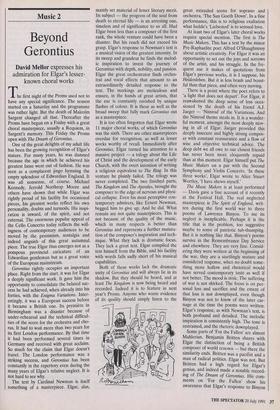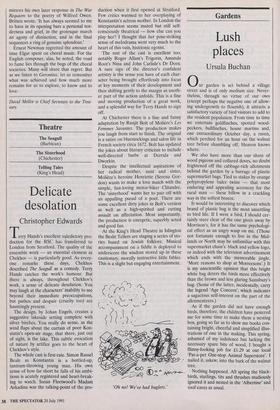Music 2
Beyond Gerontius
David Mellor expresses his admiration for Elgar's lesser- known choral works he first night of the Proms used not to have any special significance. The season started on a Saturday and the programme was rather light. But the death of Malcolm Sargent changed all that. Thereafter the Proms have begun on a Friday with a great choral masterpiece, usually a Requiem, in Sargent's memory. This Friday the Proms open with The Dream of Gerontius.
One of the great delights of my adult life has been the growing recognition of Elgar's stature. For many years, he was damned because the age in which he achieved his greatest fame went put of fashion. He was seen as a complacent jingo hymning the empty splendour of Edwardian England. it was all nonsense, of course. Michael Kennedy, Jerrold Northrop Moore and others have shown that while Elgar was rightly proud of his facility for occasional pieces, his greatest works reflect his own personality, doubts and turmoils. His inspi- ration is inward, of the spirit, and not external. The enormous popular appeal of the Cello Concerto today reflects the will- ingness of contemporary audiences to be moved by the pessimism, nostalgia and indeed anguish of this great autumnal piece. The true Elgar thus emerges not as a pompous provincial caricature of an Edwardian gentleman but as a great voice of the European mainstream.
Gerontius rightly occupies an important place. Right from the start, it was for Elgar a deeply significant work. It gave him the opportunity to consolidate the belated suc- cess he had achieved, when already into his forties, with the Enigma Variations. Inter- estingly, it was a European success before it became a British one. Its premiere in Birmingham was a disaster because of under-rehearsal and the technical difficul- ties of the score for the orchestra and cho- rus. It had to wait more than two years for its first London performance. By that time it had been performed several times in Germany and received with great acclaim. So much for the claim that Elgar doesn't travel. The London performance was a striking success, and Gerontius has been constantly in the repertory even during the many years of Elgar's relative neglect. It is not hard to see why.
The text by Cardinal Newman is itself something of a masterpiece. Elgar, alas,
mainly set material of lesser literary merit. Its subject — the progress of the soul from death to eternal life — is an arresting one, timeless and of significance to us all. Had Elgar been less than a composer of the first rank, the whole venture could have been a disaster. But his reach did not exceed his grasp. Elgar's response to Newman's text is a musical vision of the greatest intensity. In its sweep and grandeur he finds the melod- ic inspiration to invest the journey of Gerontius with depth, nobility, and passion. Elgar the great orchestrator finds orches- tral and vocal effects that amount to an extraordinarily detailed response to the text. The markings are meticulous and ensure, in the hands of great artists, that the ear is constantly ravished by unique flashes of colour. It is these as well as the broad sweep that fully mark Gerontius out as a masterpiece.
It is too often forgotten that Elgar wrote If major choral works, of which Gerontius was the sixth. There are other masterpieces overdue for recognition, as well as lesser works worthy of recall. Immediately after Gerontius, Elgar turned his attention to a massive project — a trilogy about the Life of Christ and the development of the early Church, with the overt intention of writing a religious equivalent to The Ring. In this venture he plainly failed. The trilogy was never completed. The two finished parts, The Kingdom and The Apostles, brought the composer to the edge of nervous and physi- cal collapse. Even his most perceptive con- temporary admirers, like Ernest Newman, begged him to give up. And he did. What remain are not quite masterpieces. This is not because of the quality of the music, which in many respects is better than Gerontius and represents a further matura- tion of the composer's inspiration and tech- nique. What they lack is dramatic focus. They lack a great text. Elgar compiled the text himself from the Bible, and his facility with words falls sadly short of his musical capabilities.
Both of these works lack the dramatic unity of Gerontius and will always lie in its shadow. But they should be heard, and at least The Kingdom is now being heard and recorded. Indeed it is to feature in next year's Proms. Anyone who wants evidence of its quality should simply listen to the
great extended scena for soprano and orchestra, 'The Sun Goeth Down'. In a fine performance, this is to religious exaltation what Isolde's ‘Liebestod' is to sensual love.
At least two of Elgar's later choral works require special mention. The first is The Music Makers. This has a text by the minor Pre-Raphaelite poet Alfred O'Shaughnessy about artistic creativity. For Elgar it was an opportunity to set out the joys and sorrows of the artist, and his struggle. In the fre- quent use it makes of quotations from Elgar's previous works, it is I suppose, his Iieldenleben. But it is less brash and boast- ful than that piece, and often very moving. There is a point where the poet refers to 'a light that does not depart'. For Elgar, it reawakened the deep sense of loss occa- sioned by the death of his friend A.J. Jaeger — 'Nimrod' of the Variations. And the Nimrod theme steals in. It is a wonder- ful moment, amongst the most deeply mov- ing in all of Elgar. Jaeger provided this deeply insecure and highly strung compos- er with constant reassurance and a flow of wise and objective technical advice. The deep debt we all owe to our closest friends has never been more eloquently repaid than at this moment. Elgar himself put The Music Makers on a par with the Second Symphony and Violin Concerto. 'In these three works', Elgar wrote to Alice Stuart Wortley, 'I have shewn myself.'
The Music Makers is at least performed — Davis gave a fine account of it recently at the Festival Hall. The real neglected masterpiece is The Spirit of England, writ- ten during the first world war to three poems of Lawrence Binyon. To me its neglect is inexplicable. Perhaps it is the title that is the problem, too suggestive maybe to some of patriotic tub-thumping. But it is nothing like that. Binyon's poems survive in the Remembrance Day Service and elsewhere. They are very fine. Consid- ering they were written at the beginning of the war, they are a startlingly mature and considered response, when no doubt some- thing more hollow and rhetorical would have served contemporary taste as well if not better. The mood is stoic. The suffering of war is not shirked. The focus is on per- sonal loss and sacrifice and the extent of that loss is not downplayed, even though Binyon was not to know of the later car- nage at the time the poems were written. Elgar's response, as with Newman's text, is both profound and detailed. The melodic inspiration is consistently high. The tone is restrained, and the rhetoric downplayed. Some parts of Tor the Fallen' are almost Mahlerian. Benjamin Britten shares with Elgar the distinction of being a British composer of world renown — but there the similarity ends. Britten was a pacifist and a man of radical politics. Elgar was not. But Britten had a high regard for Elgar's genius, and indeed made a notable record- ing of The Dream of Gerontius. His com- ments on 'For the Fallen' show his awareness that Elgar's response to Binyon mirrors his own later response in The War Requiem to the poetry of Wilfred Owen. Britten wrote, 'It has always seemed to me to have in its opening bars a personal ten- derness and grief, in the grotesque march an agony of distinction, and in the final sequences a ring of genuine splendour.'
Ernest Newman regretted the amount of time Elgar spent on choral music. For the English composer, alas, he noted, the road to fame lies through the bogs of the choral societies. Many will share that regret. But as we listen to Gerontius, let us remember what was achieved and how much more remains for us to explore, to know and to love.



















































 Previous page
Previous page